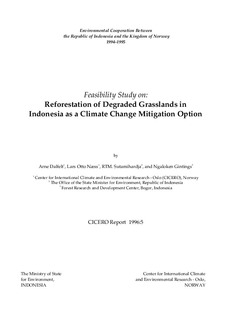Feasibility study on: Reforestation of degraded grasslands in Indonesia as a climate change mitigation option
Research report
Permanent lenke
http://hdl.handle.net/11250/192108Utgivelsesdato
1996Metadata
Vis full innførselSamlinger
- CICERO Reports [210]
Sammendrag
Deforestation and changes in land use in the tropics contribute a significant share of the anthropogenic emissions of greenhouse gases, of which the most important is carbon dioxide (CO2). Increasing the uptake and storage of carbon in the terrestrial biosphere through reforestation has been proposed as one strategy to counteract the atmospheric build-up of greenhouse gases.
This study investigates the feasibility of reforestation of degraded Imperata (alang-alang) grasslands in Indonesia as a climate change mitigation option. A primary objective has been to discuss reforestation in a local perspective, as previous experiences have demonstrated that proper attention to social aspects and issues relevant to the local communities is key to the success of reforestation. Man-made Imperata grasslands in Indonesia cover at least 8.6 million hectares of land of variable production potential. The grasslands have been spreading on former forest lands as a result of logging and slash-and-burn cultivation, and are sustained by regular burning.
